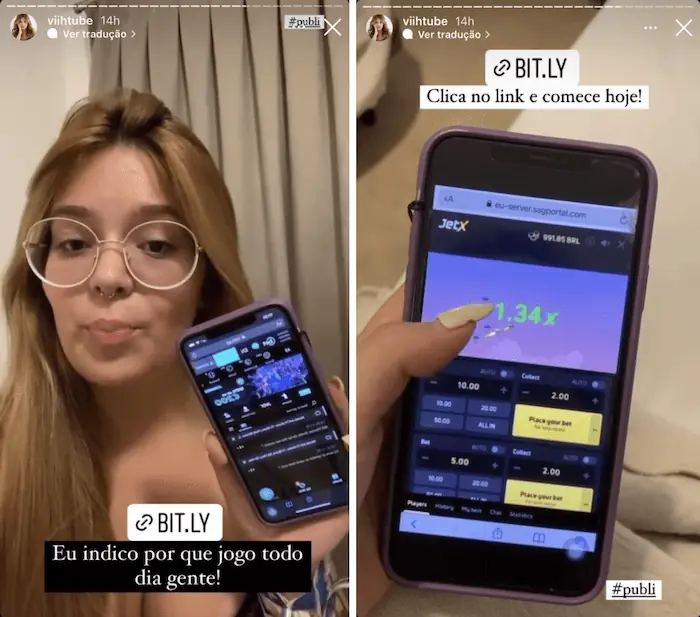This post is also available in:
The dominance of social media influencers has completely transformed how products and services are promoted online. Popular digital platforms empower these internet personalities – those with a sizable following are able to shape consumer trends, opinions and, crucially, their fans’ purchasing decisions.
Recently, there’s been a notable increase in gambling advertisements in Brazil by various influencers, including prominent figures like Felipe Neto, Viih Tube and Neymar, who have millions of social media followers. Some of these campaigns have evoked controversial reactions and exposed them to mass-media debate.
The ethical and legal issues raised have led to major scandals in several states. That has pushed authorities at all levels to investigate dubious gambling platforms and propose limits to Brazilian casino influencer marketing.
The Bold New Face of Gambling Ads in Brazil
As of 2024, 75% of all Brazilian Série A football teams rely on a main sponsorship deal with betting companies. The trend is as visible on the players’ jerseys as it is emphasized in recurring social media campaigns.
This sports betting boom is, with due proportions, replicated by the surge of online casino games. The likes of Aviator and Fortune Tiger captivated Brazilian audiences with their straightforward gameplay and thrilling potential for big wins. Most importantly, these quick-play games felt fair and simple enough, and a more user-friendly alternative to classic casino genres like roulette or blackjack.
The instant appeal of these new-age games was quickly exploited through powerful digital advertising channels. Online gaming companies teamed up with internet “celebrities”, tapping into the immense potential of their massive online following.
In the past few years, many reputable iGaming operators delayed their full-scale market entry in Brazil, anticipating the latest legislative guidelines on the matter. At the same time, the use of influencers and social media marketing remained a gray area – be that for gaming ads and promotions or almost any other social and economic context.
The Unchecked Rise of Influencers’ Casino Advertising
Social media influencers receive an enormous amount of attention for anything they say or do. When promoting real-money casino games, some of them are tempted to appeal to primal instincts and feel-good content. In an attempt to create viral and catchy content, they show off luxury lifestyles or promise big money wins to fascinate their followers.

Examples are easy to find. The influencer Virgínia Fonseca shared in her Instagram stories that she won R$ 50,000 (~USD 10,000) from gambling in only one day. It sparked criticism online, with many accusing her of promoting irresponsible gambling.
Some of those who follow the influencers simply need the money. Others decide to try their luck, trusting their tips. What is certain, however, is that this kind of advertisement has led thousands of followers to gamble on unreliable and unlicensed platforms. A number of unsuspecting Brazilians have been exposed to plain scams and unsafe gambling practices.
It is true that some of these public figures create gaming content on their own, without an elaborate scheme behind it all. However, it is crucial for them to understand the influence they have on their followers’ behavior, having gained their trust and even admiration. They need to rise to the occasion and deliver honest messages about the reality of gambling, the risks and responsibilities of safe gaming.
Casino Operators and Influencers Under Police Investigation
Recent cases of influencers involved in illegal gambling schemes illustrate precisely the complexity of real-money casino promotions. Be that for ethical, financial or other reasons, it is easy to see why such advertising content needs clear guidelines and regulation to protect consumers – and even influencers themselves – from harmful and illegal practices.
The notorious case of Blaze brought the issue into the spotlight in mid-2023. Said platform became popular in Brazil through the success of the crash-style game Aviator (known as the “jogo do aviãozinho”). Blaze came under investigation for engaging famous Brazilian influencers in promoting its games in an unscrupulous and almost predatory manner.
Their case was highlighted on a nationally acclaimed TV show, explaining how influencers were used to promote unfair games and fraudulent commercial practices. What was even more important, however, was that players were often complaining that Blaze was not paying out their winnings. Soon after, Blaze came under investigation by the São Paulo police for alleged fraud.

Viih Tube, a high-profile online figure, was regularly promoting gambling sites on her Instagram account to millions of followers. Soon after Blaze was exposed in national media, she announced the end of her contract with them. The fact remains that she induced many to trust and play with them for months.
The “Jogo do Tigrinho” operation carried out by the police in Pará and Paraná highlighted a similar case of influencers promoting the online slot Fortune Tiger. In these cases, several were arrested for deceiving followers with false promises and glamorizing quick and easy gains. Popular internet profiles promoted sudden enrichment and a luxurious lifestyle with explicit depictions of mansions, stylish trips and expensive cars.

The rise and fall of Blaze serve as a striking reminder of the regulatory gaps in the online gaming scene of Brazil. Even when a court order was issued to block the company’s website, the National Telecommunication Agency (ANATEL) could not and did not enforce the decree. Technically, Blaze was able to maintain its online presence in Brazil by creating and using mirror websites but its reputation was irreparably damaged.
For those who need more proof of the reigning legal ambiguity, towards the end of 2023 the São Paulo court decided to unblock the main Blaze website. If not the end, then the very sequence of events raises serious concerns about gaming and marketing regulations and the ease with which shady websites can circumvent legal restrictions.
The role of influencers in this narrative adds an important dimension. Following these revelations, some influencers interrupted their relations with the likes of Blaze. Others kept on promoting similar content, trying to be more transparent about it.
While this shows a growing level of awareness and responsibility influencers know they must exercise, the gaming industry cannot rely on the sensitivity of stakeholders or third parties. It needs clear standards, monitoring mechanisms and transparent regulation of commercial relations.
Self-Regulation Already Happening
Until recently, there was an almost complete lack of regulation and guidelines for gambling advertisements in Brazil. In early December 2023, the National Council for Self-Regulation in Advertising (CONAR) took a significant step towards addressing this major systemic flaw.
CONAR does not have the authority to impose its standards with legal implications. But the so-called Annex X it published deals in a consistent manner with the growing importance of real-money gaming advertisements in the context of Brazil’s mobile-first consumer market.
The self-regulation Code establishes rules for ethical advertising of betting houses and real-money online games in general. Its four key principles address:
- Advertising Identification, ensuring clear disclosure of an ad’s commercial intent;
- Accuracy and Informativeness, which mandates truthful presentation of betting;
- Protection of Children and Adolescents, focusing on safeguarding minors from gambling ads;
- Social Responsibility and Responsible Gaming (RG) which emphasize the risks of betting and prohibits promotions of excessive gambling.
Although Annex X focuses mostly on sports betting platforms, its scope could easily be extended to online casinos as well. It was issued on December 11, 2023, mere days before the approval of the new and comprehensive gambling legislation, which now includes most real-money gaming verticals. We fully expect that future updates or additional guidelines may explicitly include online casinos to reinforce the importance of ethical standards in all advertising of paid games.
Soon after, the Brazilian Institute of Responsible Gaming (IBJR) endorsed CONAR’s Annex X, stressing its commitment to responsible gaming. The IBJR has as its associate members a number of leading gaming operators active in Brazil and their support confirms a growing commitment to ethical advertising in the industry.
Legislation Slowly Taking Off
The biggest shortcoming, however, has always been on the side of legislators – Federal and State. It is only in the past few months that the lack of concrete regulation has seen some political figures finally concerned about dishonest influencer casino marketing.
The Chamber of Deputies in the Brazilian Congress approved a Bill (no. 3915/23) that prohibits influencers from advertising or promoting unregulated gambling. The bill’s authors point to the significant impact these promotions might have on people’s mental and financial well-being.
While the proposed measures still need further approval (by the Senate) and enactment (by the Executive branch), they would mandate influencers to:
- Ensure their content does not encourage or refer to unregulated betting;
- Inform their audience about potential risks and consequences;
- Clearly communicate the commercial nature of the publications;
- Include information identifying the company or individual sponsoring the content;
- Ensure that the content is not disclosed to minors.
Non-compliance by influencers would incur penalties, fines, warnings or suspensions, depending on the severity of the case.
Similar (but stricter) penalties are foreseen for companies which must disclose a list of public figures and online personalities they work with. All contracts must be formalized and define both the scope of promotional activities and the parties’ obligation to act in good faith.
Of course, the end of 2023 saw the adoption of the crucial Law No. 14.790/23 which regulated fixed-odds betting. The Act defines a wide range of real-money gaming segments and provides standards for physical, online, sports-themed and all other virtual games. And although it does not specifically mention digital influencers, it advances the state of regulation on gaming advertisements.
Key provisions include:
- Guidelines for communication, advertising and marketing, essentially promoting self-regulation
- Mandatory inclusion of warnings about the risks of advertised activities
- Prohibition of misleading advertising promoting unauthorized brands or untruthful benefits
- Explicit prohibition of marketing in schools or targeting minors, including proper age-group labeling.
The Way We See It – Gaps Still Remain
On one hand, the proposed Bill 3915/23 (on “influencer marketing”) does not take into account many industry specifics, if only for the fact it was developed before actual regulation was enacted on real-money games across Brazil. It does not identify well enough “illegal” operators and game types and leaves way too many loopholes and room for interpretation.
On the other hand, it also fails to address the issue of monitoring, especially of social-network activity, profiles and channels. This leaves the question about effectively enforcing the potential law, especially given the vast number of influencers and content creators.
The Bill also neglects to impose the responsibility of promoting awareness – through campaigns of public messages. That leaves the task, possibly, to government agencies or NGOs but the issue is never clearly dealt with.
Last but not least, the proposal misses out on providing an actionable link between the fresh regulation of real-gaming and the responsible promotions. One way to enforce ethical advertising of the gaming industry is to tie part of the licensing procedure to clear obligations of transparency and keeping advertising agents in check.
The Benefits of Proper Licensing
By integrating current proposals into industry standards, we can easily justify the creation of a rigorous but clear licensing system for real-money gaming operations in Brazil. Federal-level gaming licenses can bring numerous benefits to the industry, the consumers and the public interest.
We’ll see improvements in:
- Consumer Protection – ensuring safe and fair gaming and limiting exposure of minors
- Legal Compliance – aligning advertising practices with national laws and standards
- Prevention of Illegal Activities – curbing unregulated and deceptive gambling promotions
- Safeguarding the Vulnerable – shielding susceptible users from gambling risks.
- Ethical Advertising – stressing that real-money games are for entertainment only and encouraging responsible gambling.
The Good Examples – Policy and Practice
As things stand, the current legal framework still creates ambiguities. Hopefully, Brazil is on the right track, yet it is crucial to use mature gambling markets as reference. These are jurisdictions (countries or states) where gaming regulation has been in force for a longer time and has had proven effects.
Many of the success stories come from Europe, where marketing guidelines are part of the bigger picture – proper regulation, law enforcement and public education and awareness campaigns. The effectiveness of these measures also depends on the cooperation between stakeholders (government agencies, regulators and gaming operators) in a manner that preserves their integrity and the market transparency.
Organizations like the European Gaming and Betting Association (EGBA) have a code of conduct for responsible advertising in online gambling, valid across the European Union.
Sweden, follows both the general EGBA guidelines and implements its own specific national norms to regulate gambling advertising. These rules are adapted to the specifics of Sweden’s legal and cultural context.
France was the first European country to approve a law that regulates influencer marketing. It could serve as an example for Brazil, as it provides detailed rules on promotional campaigns on social media and other digital marketing channels. The French law dictates transparency and responsibility in influencer publications, including concrete penalties for infractions.
Adapting similar guidelines to the local context could provide Brazil with a pragmatic approach to regulating online gambling ads. These include the main pain points we identified earlier:
- Clarity – in identifying activities, content and relations so as to avoid ambiguity and loopholes;
- Structure – in setting up roles and responsibilities, including monitoring and enforcement procedures and agents;
- Focus on Responsible Gaming – from RG messages and awareness campaigns to the prohibition of misleading claims.
What We Hope to See in Brazil
Brazil is undergoing significant changes in the regulation of sports betting and online casino games. The recent full legalization of these activities still leaves some gaps in definitions, commercial relations and related practices.
Given the size and potential of iGaming in Brazil, many of these uncertainties should be addressed through state-of-the-art legislation. Still, we expect to see more working solutions proposed and implemented by industry stakeholders – website operators, gaming providers, payment service providers and a range of consumer protection associations.
Influencer advertisements are only one side of real-money casino marketing, albeit one of the most influential kinds. One way or another, those that adopt ethical standards and stick to fair commercial practices will be rewarded by the market in the long run.
A transitional period lasting months and years can see, however, many consumers and gaming fans exposed to deceitful content and plain fraud. This is where the responsibility of public figures can make a difference – be those public servants (e.g., politicians) or popular individuals (e.g., influencers).
Where market forces fail to provide for vulnerable consumers, stringent control and sanctions usually do the trick.
Adopting good practices and sticking to responsible models of transparent marketing can only strengthen Brazil’s real-money gaming market. And if the thousands of social media influencers come to think about that, better legal protection is good for them se well, and their own positive public image.


